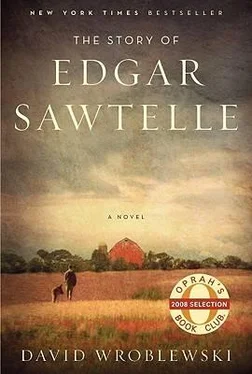“But everything you say applies to children who can’t hear, not to children who can’t make sound. And there’s no doubt that Edgar can hear.”
“But what about speech? A person communicates by giving as well as taking, by expressing what is inside. Infants learn this by crying-they learn that drawing attention to themselves in even the most primitive way gains them warmth and food and comfort. I worry about your child, Mrs. Sawtelle. I wonder how he’ll learn these things. Let me tell you about myself for a moment. When I was born, my own parents were faced with a dilemma: how could they teach me to speak? They had not learned until it was far too late-in their teens-and so they mastered everything but the production of intelligible speech. And now they had a daughter who they wanted more than anything in the world to speak normally.”
“What did they do?”
“They assumed that I was learning even when I seemed to be doing nothing. They played records with conversations, though they couldn’t hear anything themselves. They bought a radio, and asked their hearing friends to tell them which stations to tune in, and when. They watched my mouth to see if I was making sounds. They arranged for me to spend time with people who could play with me and speak to me. In short, Mrs. Sawtelle, they made sure that verbal language was available to me in every way they could imagine.”
“But there must have been more to it than that. How did they respond when you spoke your first words? How did they encourage you when they couldn’t hear you speak?”
Mrs. Wilkes talked then about the readiness of babies to learn language, how impossible it was to prevent, so long as examples were available. How isolated twins sometimes invented private languages. She went on for quite some time. She had worked with both deaf children and the hearing children of deaf parents, she said, and there was a simple principle: the baby wanted to communicate. It would learn whatever was given as an example, whether English, French, German, Chinese, or sign. As a child, she had learned to sign as well as speak, almost effortlessly. This last point, she said, was most significant for the Sawtelle baby.
“But how can I teach him to sign?” Trudy said. “I don’t know how myself.”
“Then you will learn, together,” Mrs. Wilkes said. “At first, you only need to know enough to talk with Edgar in the simplest ways.”
“Which are?”
“Which are to tell him you love him. To say, here is food. To name things: Dog. Bird. Daddy. Mama. Sky. Cloud. Just like any child. Show him how to ask for things he wants by moving his hands in that sign. Show him how to ask for more of whatever he wants”-and here she bounced the fingertips of both hands together as she talked, to demonstrate-“and later, when the time comes to make sentences, you’ll already have learned how to do that.”
Their conversation went on late into the evening. When Gar came in from the kennel, Mrs. Wilkes began demonstrating the basics. She said she could explain a few signs and straightforward syntax in an evening, and she began with simple words and simple sentences. She showed them a subject-verb-object sentence: “Trudy loves Gar.” She explained the miraculous way in which pronouns are used. She demonstrated an adjective.
Trudy was mesmerized, repeating the signs and following Mrs. Wilkes’s corrections studiously. Gar tried as well, though he lacked Trudy’s coordination and grace. It was near midnight before the woman left-far past the time when they usually went to sleep. Edgar had roused several times during the evening, and when they took him up, Mrs. Wilkes demonstrated how to say “food” and move Edgar’s hands. This was harder, since it required performing the sign backward. But it was possible. And Trudy understood the enormous leverage that practice gives the determined trainer.
THIS WILL BE HIS EARLIEST MEMORY.
Red light, morning light. High ceiling canted overhead. Lazy click of toenails on wood. Between the honey-colored slats of the crib a whiskery muzzle slides forward until its cheeks pull back and a row of dainty front teeth bare themselves in a ridiculous grin.
The nose quivers. The velvet snout dimples.
All the house is quiet. Be still. Stay still.
Fine, dark muzzle fur. Black nose, leather of lacework creases, comma of nostrils flexing with each breath. A breeze shushes up the field and pillows the curtains inward. The apple tree near the kitchen window caresses the house with a tick-tickety-tick-tick. As slowly as he can, he exhales, feigning sleep, but despite himself his breath hitches. At once, the muzzle knows he is awake. It snorts. Angles right and left. Withdraws. Outside the crib, Almondine’s forequarters appear. Her head is reared back, her ears cocked forward.
A cherry-brindled eye peers back at him.
Whoosh of her tail.
Be still. Stay still.
The muzzle comes hunting again, tunnels beneath his blanket, below the farmers and pigs and chicks and cows dyed into that cotton world. His hand rises on fingers and spider-walks across the surprised farmyard residents to challenge the intruder. It becomes a bird, hovering before their eyes. Thumb and index finger squeeze the crinkled black nose. The pink of her tongue darts out but the bird flies away before Almondine can lick it. Her tail is switching harder now. Her body sways, her breath envelops him. He tugs the blackest whisker on her chin and this time her tongue catches the palm of his hand ever so slightly. He pitches to his side, rubs his hand across the blanket, blows a breath in her face. Her ears flick back. She stomps a foot. He blows again and she withdraws and bows and woofs, low in her chest, quiet and deep, the boom of an uncontainable heartbeat. Hearing it, he forgets and presses his face against the rails to see her, all of her, take her inside him with his eyes, and before he can move, she smears her tongue across his nose and forehead! He claps a hand to his face but it’s too late-she’s away, spinning, biting her tail, dancing in the moted sunlight that spills through the window glass.
BOUNCING ON HIS MOTHER’S HIP as she walks down the aisle of the kennel. Dogs rush through the canvas flaps in the barn wall, look at him, take his scent. Her voice singsong as she calls to them.
HIS FATHER, SITTING AT THE KITCHEN table, papers strewn before them. Pictures of dogs. His father’s voice quiet in his ear, talking through a line cross. The corner of a pedigree pinched between his fingers.
RUNNING THROUGH THE YARD, past the milk house, throwing the fence gate closed before Almondine can catch him. He crouches in the tall weeds and watches. She loves to jump. Her stride draws up and she sails over the fence. In a moment, she’s next to him, panting. He clenches his fist and mock-scowls. When she looks away, he bolts again. The weeds rush together behind him and then he’s in the orchard, monkey-crawling along a branch, the one place she cannot follow, dangling a hand to taunt her. All at once, the world spins. When he hits the ground, a thump sounds in his chest. He begins to cry, but the only sound is Almondine’s barking-and, after a moment, the kennel dogs.
ON THE FARTHEST APPLE TREE hangs a tire, its rope hairy and moth brown. He’s been told to stay away but forgotten why. He worms his shoulders through both circles of the rubber rim, twists, pumps his legs. The apple trees tilt crazily around him. It takes a minute for the bees to condense from shadow and sunlight, then he is trapped in the careening tire, and they sting him once on his neck, once on his arm. Hot points of light. Almondine snaps at the air, yelps, brushes a paw across her face. Then they are running to the house. The porch door slams behind. They wait to see if the bees will keep coming, grow thick against the screen. For a moment, Edgar almost believes the bees never existed. Then the stings begin to throb.
Читать дальше
Конец ознакомительного отрывка
Купить книгу












